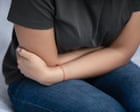Negative
24Serious
Neutral
Optimistic
Positive
- Total News Sources
- 3
- Left
- 2
- Center
- 1
- Right
- 0
- Unrated
- 0
- Last Updated
- 4 days ago
- Bias Distribution
- 67% Left


Oxford Study Links Teenage Period Pain With Elevated Chronic Adult Pain Risk
New research from the University of Oxford reveals that teenagers experiencing moderate or severe period pain face a significantly increased risk of developing chronic pain in adulthood, not limited to the pelvic area but extending to the back, joints, head, and abdomen. The study, analyzing data from over 1,100 participants, found those with severe period pain at age 15 had a 76% higher risk of chronic pain by age 26, while those with moderate pain had a 65% higher risk, compared to those with no period pain. Researchers suggest that changes in the nervous system during adolescence, a period of heightened neuroplasticity, may make the brain more sensitive to repeated pain signals, altering pain processing and contributing to chronic pain later in life. The findings underscore the need for improved menstrual education, reduced stigma, and early access to effective support and treatment for period pain, as it has broad implications for physical health, mental wellbeing, social development, and healthcare systems. Experts emphasize that menstrual pain should not be dismissed or trivialized, highlighting its significant impact on quality of life and the importance of addressing it as a public health concern. This study is the first large-scale investigation linking adolescent period pain with chronic pain in other body parts, calling for urgent attention to adolescent menstrual health.



- Total News Sources
- 3
- Left
- 2
- Center
- 1
- Right
- 0
- Unrated
- 0
- Last Updated
- 4 days ago
- Bias Distribution
- 67% Left
Negative
24Serious
Neutral
Optimistic
Positive
Related Topics
Stay in the know
Get the latest news, exclusive insights, and curated content delivered straight to your inbox.

Gift Subscriptions
The perfect gift for understanding
news from all angles.
